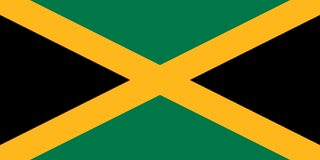
Jamaica is an island country situated in the Caribbean Sea. Spanning 10,990 square kilometres (4,240 sq mi) in area, it is the third largest island — after Cuba and Hispaniola — of the Greater Antilles and the Caribbean. Jamaica lies about 145 km (90 mi) south of Cuba, and 191 km (119 mi) west of Hispaniola ; the British Overseas Territory of the Cayman Islands lies 215 km (134 mi) to the north-west.
Transport in Jamaica consists of roadways, railways, ship and air transport, with roadways forming the backbone of the island's internal transport system.

Montego Bay is the capital of the parish of St. James in Jamaica. The city is the fourth-largest urban area in the country by population, after Kingston, Spanish Town, and Portmore, all of which form the Greater Kingston Metropolitan Area, home to over half a million people. As a result, Montego Bay is the second-largest anglophone city in the Caribbean, after Kingston.
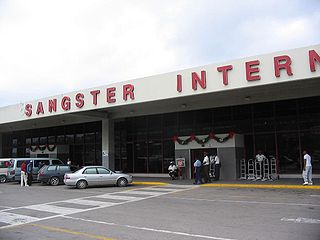
Sangster International Airport is an international airport located 3 mi (4.8 km) east of Montego Bay, Jamaica. The airport is capable of handling nine million passengers per year. It serves as the most popular airport for tourists visiting the north coast of Jamaica. The airport is named after former Jamaican Prime Minister Sir Donald Sangster.

St. James is a suburban parish, located on the north-west end of the island of Jamaica in the county of Cornwall. Its capital is Montego Bay. Montego Bay was officially named the second city of Jamaica, behind Kingston, in 1981, although Montego Bay became a city in 1980 through an act of the Jamaican Parliament. The parish is the birthplace of the Right Excellent Samuel Sharpe, one of Jamaica's seven National Heroes.
Reggae Sunsplash is a reggae music festival first staged in 1978 in northern Jamaica. In 1985, it expanded with the addition of an international touring festival. The festival ran annually until 1996, with a final event in 1998, before it was revived in 2006. The festival returned for a virtual staging in 2020 produced by Tyrone Wilson, Randy McLaren, and Debbie Bissoon.
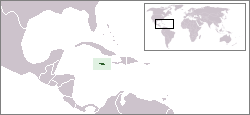
Lesbian, gay, bisexual, and transgender (LGBT) persons in Jamaica face legal and social issues not experienced by non-LGBT people. Consensual sexual intercourse between same-sex partners is legally punishable by imprisonment.

Crime is one of the most urgent concerns facing Mexico, as Mexican drug trafficking rings play a major role in the flow of cocaine, methamphetamine, fentanyl, heroin, and marijuana transiting between Latin America and the United States. Drug trafficking has led to corruption, which has had a deleterious effect on Mexico's Federal Representative Republic. Drug trafficking and organized crime have been a major source of violent crime. Drug cartels and gangs have also branched out to conduct alternative illegal activities for profit, including sex trafficking in Mexico. Some of the most increasingly violent states in Mexico in 2020 included Guanajuato, Zacatecas, Michoacán, Jalisco, and Querétaro. Some of the world's most violent cities are reportedly within the state of Guanajuato with extortion from criminal groups now being commonplace. The state of Zacatecas is said to be valuable to multiple organized crime groups for drug trafficking, specifically methamphetamine to the United States. As of 2021, Michoacán is experiencing increased instances of extortion and kidnapping due to a growing presence and escalation in the armed conflicts between CJNG and Cárteles Unidos on regions bordering the neighboring state of Jalisco. CJNG is also currently battling the Los Chapitos faction of the Sinaloa Cartel in the North Mexican region of Sonora.

Crime and violence affect the lives of millions of people in Latin America. Some consider social inequality to be a major contributing factor to levels of violence in Latin America, where the state fails to prevent crime and organized crime takes over State control in areas where the State is unable to assist the society such as in impoverished communities. In the years following the transitions from authoritarianism to democracy, crime and violence have become major problems in Latin America. The region experienced more than 2.5 million murders between 2000 and 2017. Several studies indicated the existence of an epidemic in the region; the Pan American Health Organization called violence in Latin America "the social pandemic of the 20th century." Apart from the direct human cost, the rise in crime and violence has imposed significant social costs and has made much more difficult the processes of economic and social development, democratic consolidation and regional integration in the Americas.
HIV/AIDS in Jamaica has a 1.5 percent prevalence of the adult population estimated to be HIV-positive. There has been no significant change over the last five years and therefore Jamaica appears to have stabilized its HIV/AIDS epidemic.

The Gun Court is the branch of the Jamaican judicial system that tries criminal cases involving firearms. The court was established by Parliament in 1974 to combat rising gun violence, and empowered to try suspects in camera, without a jury. The Supreme Court, Circuit Courts, and Resident Magistrate's Courts function as Gun Courts whenever they hear firearms cases. There is also a Western Regional Gun Court in Montego Bay. Those convicted by the Gun Court are imprisoned in a dedicated prison compound at South Camp in Kingston. Until 1999, the Gun Court sessions were also held in the same facility.

CanJet Flight 918 was a flight that was on 19 April 2009 to have taken off from Sangster International Airport (MBJ), Montego Bay, Jamaica, bound for Halifax Stanfield International Airport (YHZ), Halifax, Canada, but was instead seized before takeoff for hours by an armed, lone hijacker. This was likely the fourth hijacking on Jamaican soil, and the second time a Canadian airliner has been hijacked. The likely second hijacking from Jamaica occurred 21 March 1972 when a Jamaica Air Taxi charter Cessna owned by Rudy Mantel and piloted by Marsh Greene was hijacked from Montego Bay Sangster International Airport to Manzanillo Cuba by two U.S. citizens. The first hijacking may have been a BWIA 727 Sunjet on May 1, 1970. According to Mr. Wesley Chang, who was on the flight, instead of flying to Miami, the aircraft was forced to go to Havana, Cuba where the men held the 63 passengers, including the crew, hostage for approximately seven hours while demanding that the plane be refueled and flown to Algiers for a meeting with American Author Eldridge Cleaver, a Black Panther who was living there in exile. The likely third hijacking was a thwarted attempt on 3 January 1974, aboard an Air Jamaica flight at Norman Manley International Airport in Kingston.
Jamaican law allows firearm ownership on may-issue basis. With approximately eight civilian firearms per 100 people, Jamaica is the 92nd most armed country in the world.
Jamaica Air Shuttle was a domestic and western Caribbean regional airline based at the Tinson Pen Aerodrome in Kingston, Jamaica. The airline began service on 7 December 2009, offering "on-demand" scheduled and private charter services to Jamaica's international and domestic airports.
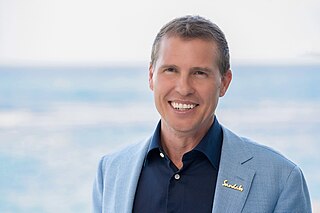
Adam Stewart CD. Hon. LLD is a Jamaican businessman. He is the Executive Chairman of the Caribbean-based resort company Sandals Resorts International (SRI) and Beaches Resorts, President of the Sandals Foundation, the philanthropic arm of Sandals Resorts International, and Executive Chairman of the ATL Group, a Jamaica-based automotive, commercial, and domestic appliance distributor. Stewart also founded Island Routes Caribbean Adventures.

Crime in Ecuador is investigated by the Ecuadorian police.

Crime in Chile is investigated by the Chilean police. However, unlike the majority of Latin America, criminal activity in Chile is low, making Chile one of the most stable and safest nations in the region. Various analysts and politicians concur that in the 2020s crime in Chile is on the rise to levels similar to the rest of Latin America. Increased murder rates and illegal drug trade are attributed by some to illegal immigration, other attribute the rise of crime more generally as the result of increased globalization.
Crime in Saint Kitts and Nevis is considerably higher than many other parts of the world. In 2012 Saint Kitts and Nevis had a homicide rate of 33.6 per 100,000 citizens, the 8th highest in the world, and the 7th highest during the period from 2005 to 2014. As of 2011 Basseterre had the highest murder rate of any capital city in the world at 131.6 per 100,000 inhabitants.
The 2022 Jamaica Premier League was the 48th season of the Jamaica Premier League, the top division football competition in Jamaica. The season kicked off on 16 January 2022 and ended on 3 June 2022.
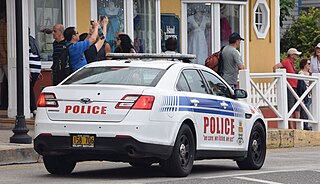
Crime in the Cayman Islands has remained low since first being recorded. The British territory is known for being one of the safest in the Caribbean, however, since March 2022, there has been an increase in gun violence which has prompted the Premier of the Cayman Islands, Wayne Panton to reassure the public that the situation is being tackled.














